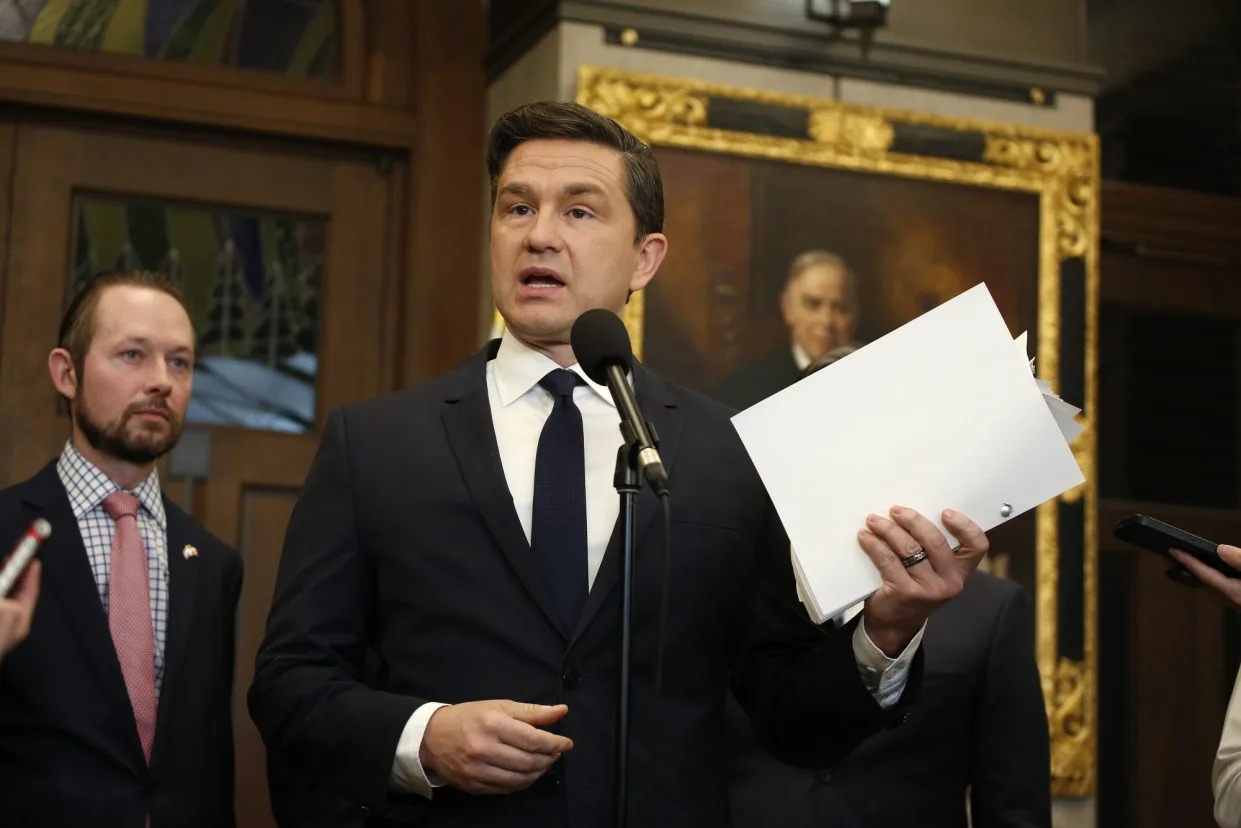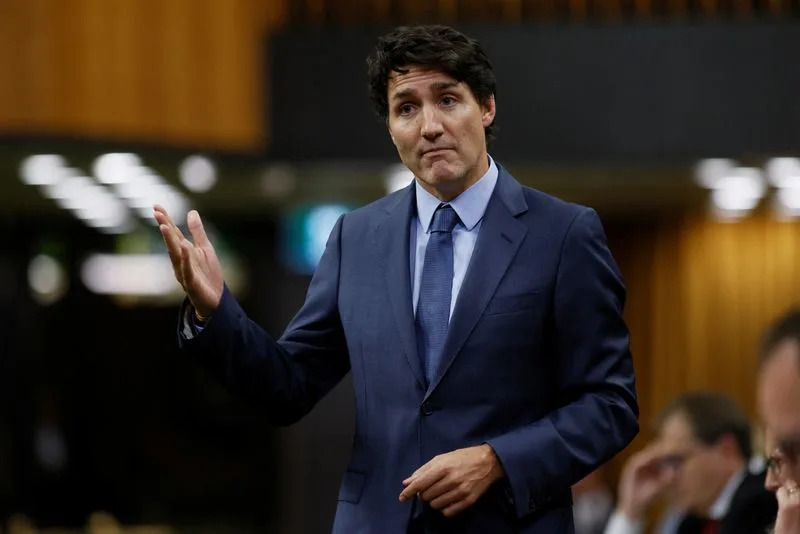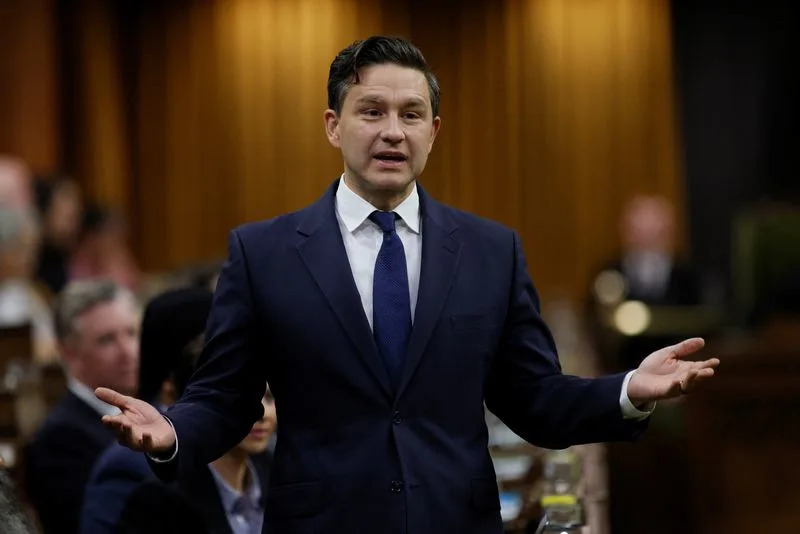Trudeau Survives Attempt to Force Snap Election by Poilievre
Brian Platt
Wed, September 25, 2024

(Bloomberg) -- Prime Minister Justin Trudeau’s main political opponent tried to force a snap election on Wednesday, but the effort failed due to a lack of support from the other opposition parties in Parliament.
It’s a scenario that may play out many times in the coming months, as Pierre Poilievre’s Conservative Party is keen to trigger an election but the smaller parties are more interested in negotiating deals with Trudeau’s Liberal Party to achieve policy objectives.
The next election is currently scheduled for October 2025, but because the Liberals don’t control a majority of seats in Parliament, the opposition parties can force an early election if they defeat the government on a key vote.
In this case, Poilievre said he was seeking an election focused on the Trudeau government’s national carbon tax, which has been in place since 2019. Poilievre argues the policy has helped create a cost-of-living crisis for Canadians by driving up the price of transport fuel and home heating. Liberals point out most residents receive more money back in rebates than they pay in the tax.
“This will be a carbon tax referendum and a carbon tax election,” Poilievre said in a speech to Parliament when he introduced his motion to bring down the government.
Poilievre’s Conservatives are far ahead in the polls, suggesting he would win a large majority government if an election were held soon. But he has no other allies willing to send voters to the polls now.
“Why the rush to trigger an election? Is this not the perfect opportunity to negotiate and make progress?” said Simon-Pierre Savard-Tremblay, a lawmaker for the Bloc Quebecois, a party that advocates for the French-speaking province of Quebec, in responding to Poilievre’s speech.
Bloc Leader Yves-Francois Blanchet set a deadline of Oct. 29 for the Liberal government to push through measures that are priorities for his party — improvements to pension benefits and protection for some agricultural sectors from trade negotiations. Should Trudeau fail to meet that deadline, Blanchet said he’d begin talks with the Conservatives and other opposition parties on toppling the government.
New Democratic Party lawmakers, meanwhile, accused Poilievre of wanting an election in order to cut health-care programs. The NDP had been in a formal power-sharing deal with Trudeau’s Liberals until earlier this month, and as a condition of that deal the Liberals had brought in new programs to help cover dental care and some drug costs.
©2024 Bloomberg L.P.
Nadine Yousif - BBC News, Toronto
Wed, September 25, 2024

[Reuters]
Canadian Prime Minister Justin Trudeau has survived a motion in parliament aimed at bringing down his government and triggering an election.
Wednesday's no-confidence vote is the first in a series of similar votes expected to be put forward by the opposition Conservative Party amid Trudeau's plummeting approval ratings.
The motion failed after opposition leader Pierre Poilievre fell short in his effort to shore up support from leaders of two other political parties in parliament, the New Democratic Party (NDP) and the Bloc Québécois.
Trudeau, who has been Canada’s prime minister for nine years, has been leading under a minority government.
Voting was held on Wednesday afternoon, on the same day as Trudeau was set to host French President Emmanuel Macron.
While this motion has failed, the Conservative party plans to bring at least two other similar no-confidence votes on Thursday in hopes of sending Canadians to the polls.
Trudeau has been facing growing pressure to step down in recent months.
His approval rating has plummeted from 63% when he was first elected to 28% in June of this year, according to one poll tracker, amid concerns about housing unaffordability and the rising costs of living. His Liberal party lost two consequential by-elections this summer in Toronto and Montreal.
A deal between his party and the NDP has helped him stay in power since Canada’s last federal election in 2021.
But the deal collapsed early in September after NDP leader Jagmeet Singh pulled out from the coalition, saying that the Liberals are “too weak” and “too selfish” to govern.
Trudeau’s leadership has been under threat since, with Conservative Party leader Pierre Poilievre stating that he would put forward a no-confidence vote.
The vote would need the approval of the majority of the 338 members of parliament (MPs) in order for it to pass.
The Liberal Party, which holds 153 seats, voted against it, while the Conservative Party, which holds 119 seats, voted in favour.
The bulk of the other seats are held by the NDP and the Bloc Québécois - both of whose members voted to defeat the motion.
In the end, the motion was defeated by 211 votes against it.
Wed, September 25, 2024

[Reuters]
Canadian Prime Minister Justin Trudeau has survived a motion in parliament aimed at bringing down his government and triggering an election.
Wednesday's no-confidence vote is the first in a series of similar votes expected to be put forward by the opposition Conservative Party amid Trudeau's plummeting approval ratings.
The motion failed after opposition leader Pierre Poilievre fell short in his effort to shore up support from leaders of two other political parties in parliament, the New Democratic Party (NDP) and the Bloc Québécois.
Trudeau, who has been Canada’s prime minister for nine years, has been leading under a minority government.
Voting was held on Wednesday afternoon, on the same day as Trudeau was set to host French President Emmanuel Macron.
While this motion has failed, the Conservative party plans to bring at least two other similar no-confidence votes on Thursday in hopes of sending Canadians to the polls.
Trudeau has been facing growing pressure to step down in recent months.
His approval rating has plummeted from 63% when he was first elected to 28% in June of this year, according to one poll tracker, amid concerns about housing unaffordability and the rising costs of living. His Liberal party lost two consequential by-elections this summer in Toronto and Montreal.
A deal between his party and the NDP has helped him stay in power since Canada’s last federal election in 2021.
But the deal collapsed early in September after NDP leader Jagmeet Singh pulled out from the coalition, saying that the Liberals are “too weak” and “too selfish” to govern.
Trudeau’s leadership has been under threat since, with Conservative Party leader Pierre Poilievre stating that he would put forward a no-confidence vote.
The vote would need the approval of the majority of the 338 members of parliament (MPs) in order for it to pass.
The Liberal Party, which holds 153 seats, voted against it, while the Conservative Party, which holds 119 seats, voted in favour.
The bulk of the other seats are held by the NDP and the Bloc Québécois - both of whose members voted to defeat the motion.
In the end, the motion was defeated by 211 votes against it.

Conservative Party leader Pierre Poilievre has been leading in several national polls [Reuters]
Pierre Polievere, who has been leading in various national polls, had urged fellow MPs to vote in favour of the motion by outlining his vision for Canada under a Conservative government.
His plan, he said on Tuesday in parliament, is “to bring home the promise of Canada, of a powerful paycheque that earns affordable food, gas and homes and safe neighbourhoods”.
But Singh, the NDP leader, said he would vote against Poilievre’s motion because he believes the Conservative Party will cut social programmes like dental care and pharmacare if it comes to power.
The Bloc Québécois - a party whose aim is to represent the interests of Quebec, Canada’s French-speaking province - has said it believes it could work with the Liberal government to secure assurances for Quebec-focused social programmes.
Trudeau was at the UN General Assembly earlier this week in New York City, where on Monday he appeared as a guest on the Late Show with Stephen Colbert.
In his interview with Colbert, Trudeau acknowledged that Canadians were going through “a really tough time” and struggling to afford gas, groceries and rent.
But he defended his leadership, saying that his government had invested in Canadians and would continue to do so.
“I’m going to keep fighting,” he said.
Trudeau survives vote of confidence in Canadian parliament, new threat looms
David Ljunggren
Updated Wed, September 25, 2024


Trudeau survives vote of confidence in Canadian parliament, new threat looms
Canada's Prime Minister Trudeau speaks during Question Period in the House of Commons on Parliament Hill in Ottawa
By David Ljunggren
OTTAWA (Reuters) -Canadian Prime Minister Justin Trudeau easily survived a vote of confidence on Wednesday after his main political rival failed to muster enough support to end nine years of Liberal Party rule.
Legislators in the House of Commons voted 211-120 to defeat a motion by the official opposition Conservative party declaring a lack of confidence in Trudeau's minority Liberal government.
Trudeau, whose popularity has slumped amid unhappiness over rising prices and a housing crisis, became more politically vulnerable this month when the smaller New Democratic Party tore up a 2022 deal to keep him in power until an election scheduled for end-October 2025.
"Today was a good day for the country because I don't think Canadians want an election," said Karina Gould, the senior Liberal in charge of government business in the House.
Despite surviving the vote, other challenges loom for Trudeau. Earlier in the day, the leader of the separatist Bloc Quebecois said he would work to bring down the government unless it quickly agreed to the Bloc's demands.
Trudeau's Liberals will soon face a second vote on one of its budget measures, which is also a matter of confidence, but are expected to also survive that. Officials said the vote could take place on Wednesday or Thursday.
"We are going to work piece of legislation by piece of legislation, issue by issue, negotiating with the different political parties," Gould told reporters.
The right-of-center Conservatives have a big lead in the opinion polls ahead of an election that must be called by the end of October 2025.
The Conservatives say they want an election as soon as possible on the grounds that Canadians cannot afford a planned increase in the federal carbon tax. They also say federal spending and crime have ballooned under the Liberals.
"Enough is enough. Costs are up, taxes are up, crime is up, and time is up," the Conservatives said in a statement.
Trudeau, while acknowledging public unhappiness, has accused the Conservatives of playing politics rather than focusing on what people need.
Bloc leader Yves-Francois Blanchet said he would keep Trudeau in power at least until end-December if he gave more money to seniors and vowed to protect a system of tariffs and quotas that protect dairy farmers, many of whom live in Quebec.
If the government did not formally do this by Oct. 29, the Bloc would talk to opposition parties with a view to bringing down Trudeau, he told reporters.
But to succeed he would need the support of the NDP, which also backed Trudeau on Wednesday. Polls indicate the party would also be in trouble if an election were called now.
(Additional reporting by Ismail Shakil in Ottawa; Editing by Frank McGurty and Deepa Babington)
No comments:
Post a Comment